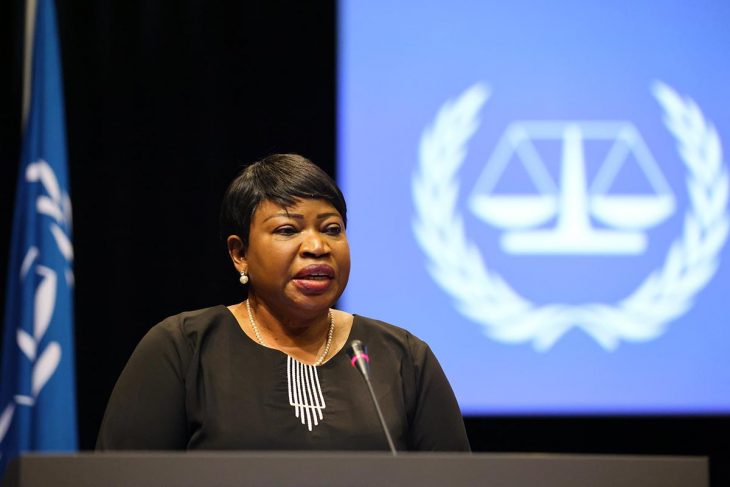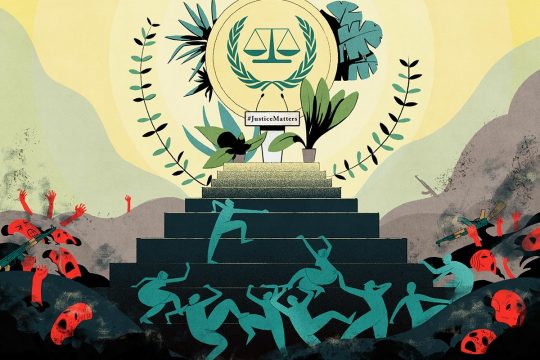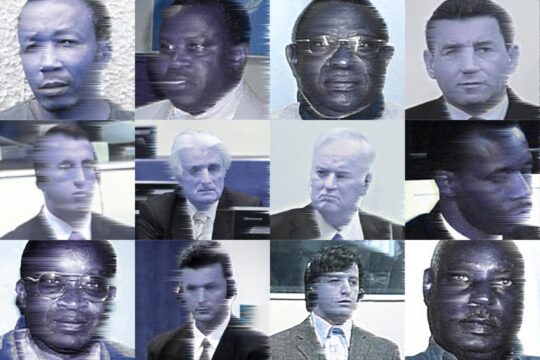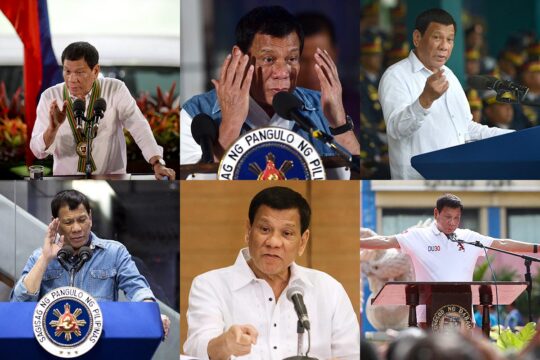One of the rituals ICC watchers observe – much like the sighting of the moon for believers to mark the start or the end of Ramadan – is the annual announcement of the preliminary examinations: which countries are being analysed by the prosecutor of the International Criminal Court (ICC) and lined up as potential subjects for investigations.
It’s now an established part of the states’ meeting in December. And under the current prosecutor Fatou Bensouda – especially since 2013 when her office published a policy paper outlining their approach – the analysis of where countries have moved up or down the mass atrocities ladder and which situations the Office of the Prosecutor (OTP) will now take forward to a full investigation, has developed into an full-on, multi-layer event.
International justice commentator Mark Kersten, in a December 2016 paper, described the regular upwards ratcheting of gears in Bensouda’s annual reports as reflecting “a growing maturity and boldness on the part of the OTP as well as an evident willingness to challenge major powers”. Carsten Stahn of Leiden University in 2017 in the Journal of International criminal Justice, described how the very breadth of the international crises being dealt with “have turned [preliminary examinations] partly into a new species of proceedings, somewhere between internal analysis, atrocity alert, and monitoring of situations.”
Clearing the prosecutor’s desk
This year, the prosecutor was again flanked by a team of acolytes from her office, called to support her approach. But it was unusual in at least two ways. Because of the pandemic, members of the prosecution team appeared from their separate homes and offices via WebEx presentation. And because it was the last presentation by a nine-year long tenured prosecutor whose mandate will come to an end in June.
The introduction was made by her deputy James Stewart, who framed this last announcement by the Bensouda (boys’ band) team as an opportunity also to look back at the past “with a measure of pride [at] what was achieved on Fatou’s watch”. Also in attendance was her chef de cabinet Sam Somanesh, and the acting head of the preliminary examinations section Rod Rastan.
So what did this last presentation by Bensouda tell us about her approach and any direction the Office of the Prosecutor is moving in? And what legacy is she leaving her successor, due to be elected next month?
Bensouda had several very specific messages, beyond the simple announcement of who was ‘up or down’ in the potential investigation stakes. First off, she was “busy delivering on my pledge made last year” to bring as many preliminary examinations as possible to term, despite a difficult year while the pandemic affected her office’s capacity. That pledge meant making as many decisions as possible on whether the criteria had been met to open an investigation or not. And if they “remained” on the books of her Office, to set benchmarks to provide all parties with clarity on what was expected of them. She pointed out that four preliminary examinations had been concluded during the year: Palestine which had been announced earlier; Nigeria and Ukraine where each would have an investigation opened (but no funding to make them start); and the Iraq-United Kingdom (UK) situation, which was closed. And on her current projections, she said it was likely that at least one other situation would be decided on before handover to her successor in June.
UK’s army is off the hook
Her second big message was that there is a “chronic mismatch” between the resources she has and the expectations of victims, states – everybody – and it will only get worse. Prioritisation of different situations shouldn’t mean abandoning her mandate because of resource constraints, she stressed. She complained that there is a “real resource gap” with the “sheer scale of crimes requiring our response”, plus her office was under real strain when a suspect was suddenly arrested and transferred in connection with a situation that had been dormant: “This is already my office’s painful experience,” she said. According to the 2020 OTP budget, the core preliminary examination section is only 12 staff members to cover all of the potential situations to be decided upon. That said, the section has been re-organised to also hear regular advice from the investigations, prosecution and cooperation teams, so that when an examination turns into a real investigation, they don’t start from scratch.
By the time of the announcement, the decision not to pursue UK defence forces over allegations of torture and war crimes in Iraq had already been the big headline. Bensouda was clearly stung by suggestions – “caricatures” as she put it – that the decision was a “degenerate display of double standards”. Rather she said it was “an intellectually honest and candid effort” in which her office showed exactly how they got to these conclusions.
Patryk Labuda of University Amsterdam remains flummoxed though that the Office of the Prosecutor concluded, after 10 years and the examination of thousands of allegations, that “they could not substantiate allegations that the UK investigative and prosecutorial bodies ‘had engaged in shielding’” UK soldiers from prosecution before national courts. He recognised the difficulty of a detailed analysis of the genuineness of domestic proceedings. But “the fact that she reached this determination, I think speaks volumes about her vision of the international criminal justice. What is the International Criminal Justice Project? Many states will be very happy with what the prosecutor decided. But a lot of people will argue it's not the OTP's role to make these kinds of determinations. They should have gone with this to the pre-trial chamber. The judges should get to decide whether these allegations are substantiated or not.”
Palestine’s hot potato and defunded Nigeria
Another big controversial decision had been Palestine, where Bensouda had concluded that crimes committed in the West Bank and Gaza were admissible at the ICC and an investigation was in the interests of justice. Even though Palestine had referred itself to the court to allow an investigation to start, she had asked judges to first adjudicate whether her office had the territorial jurisdiction for investigation. Her intention was to “ensure a swift resolution,” she said – better now than years down the line when a suspect is in the dock. And while acknowledging that this was “very, very complex, both legally and factually”, and an issue which had divided scholars, she was hoping to get a decision from those judges in early 2021.
Bensouda described the “scale of violence” in Nigeria as “unprecedented” with around 40,000 deaths including over 16,000 civilians at the hands of both Boko Haram and the Nigerian armed forces. “Both sides” were responsible for war crimes and crimes against humanity, she said. That justified her decision to move to the investigation stage. Yet that wouldn’t be for now, due to lack of funds.
The Russian trap in Ukraine
For Ukraine, which was also moved to the investigation stage, albeit unfunded, Bensouda described the ongoing armed conflict in the east where 10,000 have been killed since 2014, with alleged intentional directing of attacks against civilians. British Barrister Wayne Jordash has worked with the Ukrainian authorities on local investigations. He says the ICC prosecutor has already received a flood of information on the alleged crimes of the separatists in the pro-Russian side, from an “incredibly active” civil society and government. But he cautions the ICC investigation, were it to actually kick off, would run into problems: “You're talking about probably thousands of hours of tapes” from the state security service, which would, “take a well-resourced team, working full time, probably years rather than months to get through it”. Then there’s the problem of who to arrest in the end, with no cooperation likely from the pro-Russian separatists. “In years to come, when the prosecutor issues applications for arrest warrants, they're not going to be able to get hold of the Russians. But they will be able to get hold of the Ukrainians. And so you need to start investigating and prosecuting your own side, you know, which always falls on deaf ears, to be honest,” Jordash anticipated.
Guinea and Colombia: The virtue of waiting
Two important long running situations may finally get a form of resolution during 2021. Both Colombia and Guinea have been under examination for years. Both have domestic proceedings. And both will have “benchmarking frameworks” set up to determine whether they are sticking to those guidelines, to keep them out of the ICC Prosecutor’s hair, rather than reappearing in the preliminary examination lists, year in year out.
On Guinea, Bensouda said “we have done everything we can” to encourage Guinean authorities, and she felt they made progress last year with promises to have constructed premises to hold the trials of those alleged responsible for the stadium massacre in September 2009. In a number of cases, like Guinea, there are national proceedings but it’s not always clear “whether [the authorities are] progressing the investigation”, said Rastan. A different way to approach it – benchmarking – would help the ICC Office of the Prosecutor assess whether a process is genuine or relevant or whether the ICC should close their examination – by articulating “redlines”, he said, that if a country crossed, the ICC Prosecutor would be justified in re-opening their preliminary examination.
Santiago Vargas Nino lectures in international criminal law at the university in Bogotá, but speaking in a personal capacity, he outlined how “complex”, for example, the Colombian situation had been for the ICC Prosecutor to analyse: “There are five areas of substantive interest which have been investigated by at least three distinct jurisdictions within Colombia, two of which were born from different peace negotiations… And that's why the goalposts keep moving.”
He sees Colombia as “like this laboratory for positive complementarity”, which “has yielded the Justice and Peace Chambers, the special framework for peace, the Special Jurisdiction for Peace”. Therefore – and he knows this is “kind of paradoxical to say” when the ICC preliminary examination has already taken 17 years – “it’s important for OTP not to be hasty, [because] it's important to bear in mind that this isn't just about assessing whether the statutory requirements for an investigation are met, but also catalysing domestic efforts at international justice, which are in their infancy.”
A technocratic approach
Apart from those big headlines, the rest of the Prosecutor’s report on preliminary examinations is about a number of countries where there is much that is highly technical on jurisdiction, types of crimes, admissibility. For example, Venezuela has two preliminary examinations being conducted. In one case looking at crimes committed by the government of Nicolas Maduro; and in the other looking at crimes committed against it. Vargas Nino says so far, the OTP approach has been “an exercise in caution” as they try to assess crimes, willingness to prosecute, gravity and in one situation whether they even have jurisdiction.
That technocratic approach has been at the heart of the Bensouda approach. “I don’t do politics,” she declaimed. She acknowledged that her decisions are sometimes not so popular, but “the office does not do popularity contests.” If it’s not a popularity contest – although it can feel like it as you try to understand why this preliminary examination has turned into an investigation and not that one – the question of what the preliminary examination stage at the ICC is for, is still unresolved. Can the ICC actually use the preliminary examinations to influence states by putting them on notice? Can the ICC threaten sufficiently to force a domestic investigation and trial? The jury is still out. Especially when you consider the victim of an atrocity in – say – Nigeria. So far, being investigated by the ICC rather than being examined by The Hague may make little difference to them.








